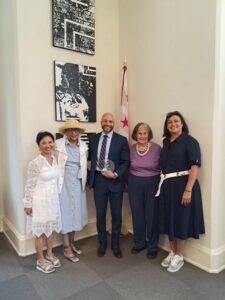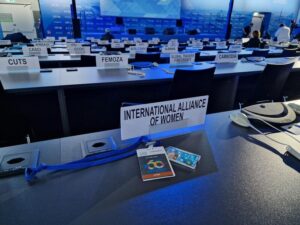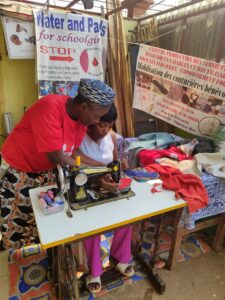Women’s organizations, the coordinating organizations of civil society: Atria and Wo=Men, the Women’s Representative 2018, and the Government Delegation to the CSW came together to evaluate the Agreed Conclusions of the CSW March meeting.
The mood was jubilant. For the first time in at least five years, every paragraph met with consensus and that did not harm the content. The unity of the European Union was maintained, the EU delegation worked hard!
Positive results are the recognition of women human rights defenders, diversity of women and girls, new agreements on reproductive health disparities, maternal mortality, health workforce en reaffirmation of existing commitments to Sexual Rights and Health Rights (SRHR).
There is a strong text on girls education, including all the barriers to it, such as the feminization of poverty, child labour that girls undertake, child, early and forced marriage, female genital mutilation, early and repeat pregnancies, all forms of gender based violation in and outside of school, including sexual violence and harassment on the way to and from school, the lack of safe and adequate sanitation facilities, the disproportionate share of unpaid care and domestic work, and gender stereotypes and negative social norms that lead families and communities to place less value on the education of girls than boys.(para 21)
The Commission expresses deep concern that as a result of lack or limited access to essential healthcare services and information and limited agency over their own lives rural women experience significant disparities in health, including reproductive health outcomes, such as higher rates of maternal and infant mortality and morbidity, obstetric fistula and limited options for family planning, than women in urban areas. These disparities are further exacerbated by multiple and intersecting forms of discrimination, (para 24).
Positive was also that instead of ‘the’ family now the word ‘family’ was used, not, as we would want, ‘different forms of family’, but it meant progress. In that paragraph (28) it says further that the rights, capabilities and responsibilities of all family members must be respected.
There is also recognition for the contribution of older women, including widowed women, to households and communities, especially where they are left behind by migrating adults or as a result of other socio-economic factors to assume childcare, household and agricultural responsibilities.(para 40).
There is a call for men to take on family responsibilities, including childcare and for paternal leave!(gg)
In the calls for action there is also an emphasis on education for girls, revising textbooks, recruiting of qualified (female) teachers, combat gender norms that devalue girl’s education and prevent women and girls from accessing education. (para kk)
para ll: Take steps to promote educational and health practices in order to foster a culture in which menstruation is recognized as healthy and natural, and girls are not stigmatized on this basis, recognizing that girl’s attendance at school can be affected by negative perceptions of menstruation and lack of means to maintain safe personal hygiene, such as water, sanitation and hygiene facilities in schools that meet the needs of girls.
Also the necessity of sexual education got a paragraph: oo. It is very long and shrouded, so it does not tread on any toes, but the idea is saved and it should further self-confidence and respectful relationships.
The delegation was disappointed that labour rights and ILO conventions were not in the text, but the are in the preamble. We would also have liked ‘women and girls in rural areas’ instead of rural women and girls, to show that not everyone in a rural area is a farmer. And SOGI (sexual orientation and gender identity) has disappeared from the text.
This year for the first time there was a NGO member included in the delegation! It was a great success, she was an expert on land rights. So the civil servants were not sure if next year there would a similar person be found, but it was mentioned that for the communication with the NGOs it was also necessary. So it is almost sure there will be someone included in the delegation.
The Women’s Representative has a different role, she was not in the delegation but there was a meeting every day. She attended and contributed to a huge number of side events and got a lot of contacts. In the GA meeting, she will be in the delegation and she gets to address the General Assembly. The Dutch have had a Women’s Representative (selected by the Dutch Women’ Council) since the beginning of the UN. It was an initiative of our then Queen Juliana.
The NGO lunch at the Permanent Representation is very useful every year as is the EU lunch.
The question now is: how are the AC’s implemented? Ideas are: a follow up in the shadow report of CEDAW, the progress report on the SDG’s, involving other departments than External Affairs and Education/Emancipation, a symposium.
Cooperation of all was very effective and very pleasant. With Anje Wiersinga we were very happy with this meeting.


